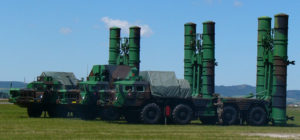
Moscow’s decision to send the S-300 missile defense system came after a Russian plane was mistakenly downed by Syrian air defense, killing 15 Russian serviceman on board, during an Israeli air strike in Latakia.
By i24NEWS
Russia has delivered its S-300 missile defense system to Syria as promised, Defense Minister Sergei Shoigu told President Vladimir Putin on Tuesday.
“We have completed the delivery of the S-300 system,” Shoigu said according to Russia Today (RT) adding that the system consisted of 49 pieces of military equipment, such as radars, control vehicles and four launchers.

Israel’s Defense Minister Liberman meets with Russian counterpart Sergei Shoigu, to discuss planned S-300 missiles shipments to Syria. – Photo: IDF Spokesperson’s Unit
The system will be ready on October 20, and Russia will “prepare and train” Syrian personnel to operate it within three months, according to RT.
Russia’s Foreign Minister Sergei Lavrov on Friday confirmed that in front of the UN General Assembly that “the deliveries (of the S-300s) started already,” and said that “the measures (taken) will be devoted to ensure 100 percent safety and security of our men in Syria.”

After downing a Russian aircraft & killing all 15 on board when firing at Israeli jets, now the Russians themselves will train the Syrians how to properly operate the S-300 missile defense system. – By Shlomo Cohen, Israel Hayom
The Russian announcement came on the heels of an incident that sparked a diplomatic crisis between Russia and Israel after a Russian plane was mistakenly downed by Syrian air defense, killing 15 serviceman on board, during an Israeli air strike in Latakia.
Russia, which is backing Syrian President Bashar Al-Assad’s government forces in the country’s civil war, has largely given Israeli warplanes a free hand over Syrian skies turning a blind eye to frequent strikes on Iran-backed forces.
The two countries have up until now successfully operated a delicately balanced direct military coordination mechanism meant to limit accidental clashes due to conflicting interests.
Israel has communicated to Russia’s President Vladimir Putin that, together with the backing of US President Donald Trump, it will continue to act in Syria, restating its right to self-defense and freedom of operation.
“Through this mess, we’ve been able for three years to avoid any clash between … between Russian and Israeli forces,” Netanyahu told CNN. “I think there’s a desire on both our part and Russia’s part to…. avoid a clash.”
However, Russia’s delivery of the S-300 missile defense system to Syria posed a “complicated challenge” for Israel but said that it would not provide a full-blown threat to the security of the Jewish state, a senior Israeli official said on Friday.
“The S-300 is a complex challenge for the State of Israel. We are dealing with the (decision) in different ways, not necessarily by preventing shipment (of the anti-aircraft system),” the official said.
In an interview with China’s Xinhua news agency on Tuesday, Syria’s Deputy Foreign Minister Faisal Mekdad stressed that although the S-300 system will only be used if Israel attacks Syria, although it has the capability of reaching Israeli territory.
Deemed to be more efficient and advanced than any other interceptor missile system currently in Syrian possession, the S-300 can intercept not only planes but also ballistic missiles with ranges of up to 250 kilometers and at a very high altitude. The delivery of the system would thus make Israeli jets far more vulnerable in any future operations in Syria.

Israeli command of the mid-East skies: Reported on Israel’s TV News, Israel’s F-35 Adir was photographed flying over Beirut completely unnoticed. (There must have been TWO… someone took this picture.) – Screenshot/ Israel’s TV NEWS
Israel together with the United States have vociferously opposed the decision by Russia to supply weaponry to Syria which they claim could exacerbate an already volatile situation and could impede Israel’s efforts to prevent Iran from gaining a foothold in the region.
In New York this week, Netanyahu vowed to continue “to act to prevent the Iranian military entrenchment in Syria.”
Israel admitted earlier this month that it carried out more than 200 airstrikes and 800 missiles in Syria over the last year, many of which it claimed were targeting Iranian positions and convoys transferring weapons to Hezbollah, the Iranian backed proxy operating in Syria.
View original i24NEWS publication at:
https://www.i24news.tv/en/news/international/middle-east/185476-181002-russia-s-300-missile-defense-system-arrived-in-syria






 Israeli New Shekel Exchange Rate
Israeli New Shekel Exchange Rate